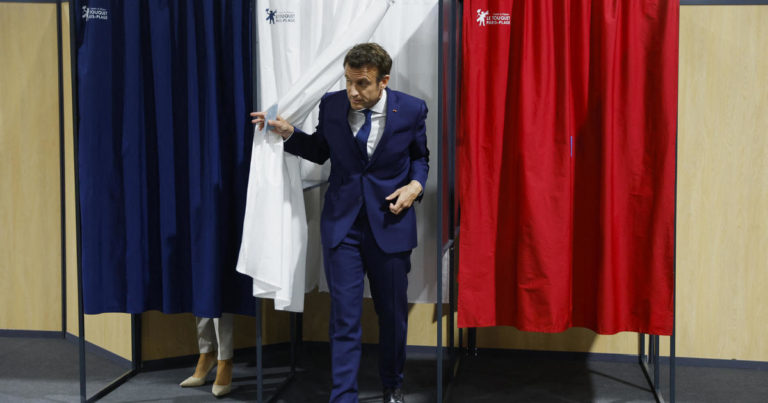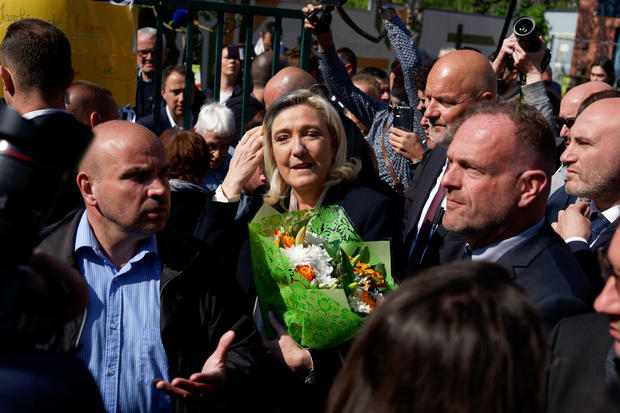
Paris — French polling agencies are projecting that centrist incumbent Emmanuel Macron will win France’s presidential runoff Sunday, beating far right rival Marine Le Pen in a tight race that was clouded by the Ukraine war and saw a surge in support for extremist ideas.
If the projections are borne out by official results, Macron would be the first French president in a generation to win a second term, since Jacques Chirac in 2002. But he would face a divided nation and a battle to keep his parliamentary majority in legislative elections in June.
Five years ago, Macron won a sweeping victory over Le Pen to become the youngest French president. The margin is expected to be way smaller this time: Polling agencies Opinionway, Harris and Ifop-Fiducial projected that Macron would win between 57% and 58.5% of the vote, with Le Pen getting between 41.5% and 43%.
Many voters found the rematch less compelling than in 2017, when Macron was an unknown factor, having never previously held elected office. Leftist voters — unable to identify with either the centrist president or Le Pen’s fiercely nationalist platform — were agonizing with the choice on Sunday. Some trooped reluctantly to polling stations solely to stop Le Pen, casting joyless votes for Macron.
Gonzalo Fuentes / AP
“It was the least worst choice,” said Stephanie David, a transport logistics worker who backed a communist candidate in round one.
It was an impossible choice for retiree Jean-Pierre Roux. Having also voted communist in round one, he dropped an empty envelope into the ballot box on Sunday, repelled both by Le Pen’s politics and the persona of Macron.
“I am not against his ideas but I cannot stand the person,” Roux said.
Macron, 44, went into the vote with a sizeable lead in polls but unable to guarantee victory from a fractured, anxious and tired electorate. The war in Ukraine and the COVID-19 pandemic battered Macron’s first term, as did months of violent protests against his economic policies.
The upheavals created fertile ground for Le Pen, who is making her third attempt to become France’s first woman president. Campaigning hard on cost-of-living issues, she made deep inroads among blue-collar voters, in disaffected rural communities and former industrial centers.
Even if the 53-year-old stops short of the presidential Elysee Palace, a high score Sunday would still be a victory of sorts for the far right. Macron beat Le Pen handily in 2017 — 66% to 34% — but the result is projected to be closer this time.
So close that some felt compelled to turn out to block her ascent.
Getty Images
Marian Arbre, voting in Paris, cast his ballot for Macron “to avoid a government that finds itself with fascists, racists.”
“There’s a real risk,” the 29-year-old fretted.
As the only nuclear-armed power in the European Union, the outcome in France was being watched across the 27-nation bloc, which — with Russia’s war in Ukraine — is grappling with its worst security crisis since World War II. France has played a leading role in international efforts to punish Russia with sanctions and is supplying weapons systems to Ukraine. Le Pen’s ties to Russia became an issue during the campaign, raising questions as to how she would deal with the Kremlin if elected.
Nearly 49 million voters were eligible to cast ballots.
Le Pen voted in the northern town of Henin-Beaumont, in France’s struggling former industrial heartland.
“I am serene,” she said. “I have confidence in the French.”
Macron voted in the resort town of Le Touquet on the English Channel and cast his ballot with a wink for the cameras.
Appealing to working-class voters struggling with surging prices, Le Pen vowed that bringing down the cost of living would be her priority if elected.
She argued that Macron’s presidency left the country deeply divided, pointing to the yellow vest protest movement that rocked his government before the COVID-19 pandemic.
Macron sought to appeal to voters of immigrant heritage and religious minorities, especially because of Le Pen’s proposed policies targeting Muslims and putting French citizens first in line for jobs and benefits.
Macron also touted his environmental and climate accomplishments to trawl for young voters who backed candidates on the left in round one but were often ambivalent at best, sickened at worst, about the second-round match-up. Macron said his next prime minister would be put in charge of environmental planning as France seeks to become carbon neutral by 2050.
Le Pen, once considered a climate-change skeptic, wanted to scrap subsidies for renewable energies. She vowed to dismantle wind farms and invest in nuclear and hydro energy.
